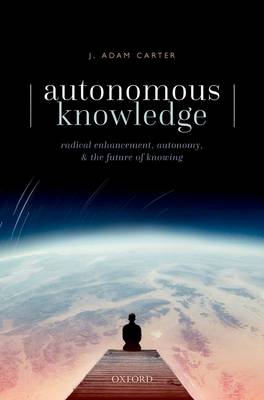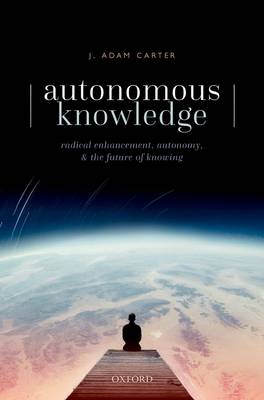
- Afhalen na 1 uur in een winkel met voorraad
- Gratis thuislevering in België vanaf € 30
- Ruim aanbod met 7 miljoen producten
- Afhalen na 1 uur in een winkel met voorraad
- Gratis thuislevering in België vanaf € 30
- Ruim aanbod met 7 miljoen producten
Zoeken
Autonomous Knowledge
Radical Enhancement, Autonomy, and the Future of Knowing
J Adam Carter
Hardcover | Engels
€ 156,45
+ 312 punten
Omschrijving
A central conclusion developed and defended throughout the book is that epistemic autonomy is necessary for knowledge (both knowledge-that and knowledge-how) and in ways that epistemologists have not yet fully appreciated. The book is divided into five chapters. Chapter 1 motivates (using a series of twists on Lehrer's TrueTemp case) the claim that propositional knowledge requires autonomous belief. Chapters 2 and 3 flesh out this proposal in two ways, by defending a specific form of history-sensitive externalism with respect to propositional knowledge-apt autonomous belief (Chapter 2) and by showing how the idea that knowledge requires autonomous belief--understood along the externalist lines proposed--corresponds with an entirely new class of knowledge defeaters (Chapter 3). Chapter 4 extends the proposal to (both intellectualist and anti-intellectualist) knowledge-how and performance enhancement, and in a way that combines insights from virtue epistemology with research on freedom, responsibility, and manipulation. Chapter 5 concludes with a new twist on the Value of Knowledge debate, by vindicating the value of epistemically autonomous knowledge over that which falls short, including (mere) heteronomous but otherwise epistemically impeccable justified true belief.
Specificaties
Betrokkenen
- Auteur(s):
- Uitgeverij:
Inhoud
- Aantal bladzijden:
- 176
- Taal:
- Engels
Eigenschappen
- Productcode (EAN):
- 9780192846921
- Verschijningsdatum:
- 1/05/2022
- Uitvoering:
- Hardcover
- Formaat:
- Genaaid
- Afmetingen:
- 142 mm x 213 mm
- Gewicht:
- 317 g

Alleen bij Standaard Boekhandel
+ 312 punten op je klantenkaart van Standaard Boekhandel
Beoordelingen
We publiceren alleen reviews die voldoen aan de voorwaarden voor reviews. Bekijk onze voorwaarden voor reviews.











